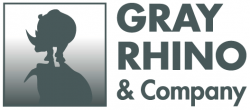Gray Rhino & Company CEO Michele Wucker gave a video keynote February 2, 2018, kicking off a special EBS Korea broadcast on the future of education in Korea.
Click on the video below and forward to 12:19 to watch. The transcript is below.

Annyeong Haseyo!
I am Michele Wucker, the author of THE GRAY RHINO. It is an honor to speak with you today on the future of society and education in Korea.
On my first trip to Korea in 2011, people told me about how the entire nation got involved in supporting students taking the Suneung College Scholastic Ability Test, even grounding airplanes so students would not be distracted. I told many people back home about how impressed I was that one of the most prominent souvenirs in airport stores was bookmarks. It seemed to me to be a great metaphor for the importance that Korea put on education.
When I visited Korea again last fall, I was disappointed that it was much harder to find the bookmarks in the airport. Perhaps this was because of the switch to e-books, or perhaps it suggested a change in attitudes toward education. Whatever the reason, I think of the bookmarks as I reflect on the future of education in Korea, and of the effect of technology: the triumph of distraction over the simple pleasure of reading a good old fashioned book while sipping tea on a winter afternoon.
Many people around the world might ask about Korea: Why would the country with among the highest education rankings in the world need to worry about education as a gray rhino –an obvious, high impact risk that is not being addressed the way it should be? Korea’s education statistics are impressive: top high school completion rates, international test scores, and university enrollment rates.
In developing this system, Korea has shown that it can recognize an educational gray rhino and respond. But that system was built for the world we are leaving behind. Let me share some other concerning facts, which are the dark side of Spending many hours in study in hagwons: Korean students spend 16 hours a week more than the developed country average.
Korea has a high suicide rate, especially among students. A survey shows Korean students as the least happy in the world. But for what? In the new economy. good test scores are no longer enough to succeed, and will become even less so in the future. Technical skills may be out of date by the time students graduate. Already, by some analyses, Korea has more college graduates than jobs available for them, and not enough people with skills taught in vocational schools – the unpredictable physical work that robots cannot do nearly as well as humans can.
The economy of the future requires humans to nurture skills that machines cannot match: creativity, innovation, decision making and strategy, and human interactions –in other words, emotional intelligence. Strict rote learning discourages creativity. When we have facts at our fingertips in our smart phones, rote learning is not as useful as it once was. Long hours of studying and lack of sleep deprive students of human interaction and the ability to concentrate and be creative.
My own personal gray rhino looks a lot like Korea’s education gray rhino. When I was in school, it was all about work and pushing harder and harder to achieve, often according to other people’s standards –just like Korean students. For my whole life, I have worked on balancing my love for hard work and my need to make time to relax in order to be as productive as possible and unleash the creativity and strategic thinking that are what I am best at.
The skills of the future –for everyone, not just managers- include analysis, structured debate, teamwork, and entrepreneurship. They are initiative, ability to question conventional wisdom in a constructive way, and above all to recognize risks, respond to them strategically, and manage change.
They include the ability to accept failure, as Thomas Edison did when asked how it felt to fail 1,000 times before inventing the light bulb. He said he had not failed, but simply found the 1,000 steps needed to succeed. Or JK Rowling, who submitted Harry Potter to 12 publishers before getting a book deal.
I created the gray rhino concept to help people to create a sense of urgency around obvious challenges that need more attention and action.
It is clear that many people in Korea have recognized a gray rhino in its education system and have a good diagnosis of the problem. The question now is how to apply that tactically and swiftly, with everyone working together with a sense of urgency.
One of the most important gray rhino questions is “WHO MUST DO WHAT TO SOLVE THE PROBLEM?”
Educational institutions must teach the skills of the future, not the past.
The government should support the appropriate standards and financial support for education and licensing.
Businesses need to work with educational institutions to communicate the needs of the job market –and to offer internships and apprenticeships to give students a path to employment.
Parents and students need to embrace new attitudes that allow students the freedom to fail forward, like Thomas Edison or JK Rowling.
None of this is easy.
That is why every single Korean stakeholder needs to embrace a key gray rhino principle as they make needed change happen: that an obstacle is also an opportunity.
Thank you so much for allowing me to share my ideas with you.
- Conversation with Peter Atwater of THE CONFIDENCE MAP - November 2, 2023
- In Conversation with Hao Hong - October 17, 2023
- Thinking Strategically at Risk Awareness Week 2023 - September 13, 2023


